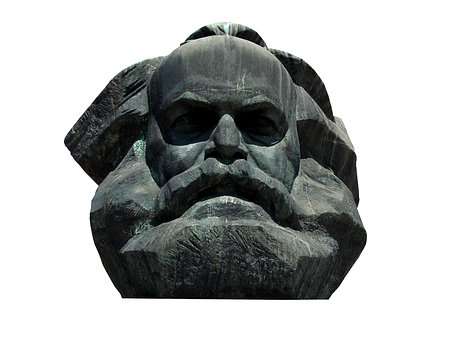“Despite the massive intellectual feat that Marx’s Capital represents, the Marxian contribution to economics can be readily summarized as virtually zero. Professional economics as it exists today reflects no indication that Karl Marx ever existed.” – Thomas Sowell
“If socialists understood economics they wouldn’t be socialists.” – F.A. Hayek
Karl Marx is a very popular name in social sciences. Being a scholar of 19th century, he is still a part of political discussions. He was born in Germany and later shifted to London where he lived with his family in exile. Marx was a sociologist and philosopher but some also see him as an economist and this write-up is a rebuttal to such thoughts.
Economics simply deals with the problem of the allocation of resources. As resources are scarce, it needs to be allocated efficiently. But, to whom? It is the people in society that are involved in such activities and therefore Economics is that science that deals with resource allocation problem in society, therefore it is a social science. Nobody has the capability to allocate these resources,[1] thus it is best done by the market mechanism. The so-called Invisible Hand.
Now, it has been accepted by all economists that the market mechanism is only an allocator of resources and the works of Mises and Hayek in the Calculation and Knowledge problem play a big role. But, Marx strictly didn’t believe in the market mechanism. Though his major problem was with Capital. But, not only now but since Adam Smith’s era or before, the fundamental of economics has been the terms like Capital, Saving, Investment, Prices, Money, Supply, Demand, Consumer, Entrepreneurship, Profit, etc. which were either criticized by Marx or were ignored by him.
Though earlier his thoughts or ideas would have been a discussion in economics but now they are nowhere to be found. In an economy, there is must need for Profit and Capital as these factors establish consumer sovereignty and enhances productivity. Marx saw profit as a rate of exploitation. According to him and his followers, the workers’ work and the profit in major share are taken by the capitalist just because he is the capital owner. Marx here clearly ignored the risk involved in a competitive market, capital accumulation is uncertain, and not all investments are converted into capital. It requires one’s risk-taking ability and skill to be an investor in a competitive market and even if anyone disagrees then they must give it a try to make small investments in the stock exchange market.
Marx also says that an increase in technological advancements replaces the workers and increases the rate of profit of capitalists. This kind of belief took place in India when computers were newly introduced, it led to mass protests led by communists who went on to destroy the computers. Now, the service sector is major contributor to the Indian economy and in service sector, it is the IT sector that is booming and opening more opportunities.[2] The IT sector is contributing to service sector both directly and indirectly. The computer that would once take away jobs is now major hope for employment in India. Not only it is providing jobs but is providing much better and more skilled jobs than there were earlier.
Technological advancement is capable of increasing the productivity. When output increases, the chances are more of an increase in employment and not the other way around. Also, Marx had a static model, in such models, one can easily form equations or make predictions. But, in reality, people aren’t static, robots are static. Marx ignored the essence of Entrepreneurship and Consumers in the market. His focus was only on workers and the evil bourgeoisie that he didn’t realize whatever happens in the market is because of consumers.
What a person deserves to earn can’t be decided by anyone, whether a politician or an intellectual. It is assumed that a capital owner isn’t working but the decisions taken by them need local knowledge of time and place which cannot be formed simply. Also, only one side of the coin is seen, the owner of capital has a possibility of losses too. But, the complaint is only against profit, if an owner faces loss then the worker would still be receiving his wages and can also change their workplace. The profit is uncertain but the wages & salaries are certain, therefore more risk more gain. Hence, the subjectivity of these matters are need to be respected. These profits don’t come easily and when they do, a share of it is invested which opens more jobs opportunities.
Though it is true that in the case of cronyism, there is unfairness. Despite being a capitalist system, the essence of competition and consumer sovereignty is lost. Marxists have been opponents to this, but unlike free marketers, they prefer more regulation to market. Their approach is unrealistic which has been already proven by economists like Mises and Hayek.
The argument against socialism has developed from an incentive problem to calculation problem to knowledge problem to self-interest problem. Not very surprisingly, the socialists have still not been able to deal with these arguments and rather try to escape them in name of “morality”. Also, they haven’t been able to develop their argument. But they are still running because the aesthetic feature of socialism deceives laymen from looking at the big dark hole inside the ideology. It is sad that with more failures of socialism in history there have been more increasing followers of a figure like Marx. Marx’s theories might be part of discussions in political science or sociology but his contribution to economics is near to none.
Economics is a subject that deals with how things are and not how things should be. Karl Marx was a thinker for which he is respected and the fact he was able to put forth his thoughts is itself commendable. But, after that, the kind of opinion his works formed was neither true and brought more misery in action and motivation of people. Even though he is claimed to be true about many things, let nobody deceive you, the truth is Karl Marx cannot be considered an economist in this era.



